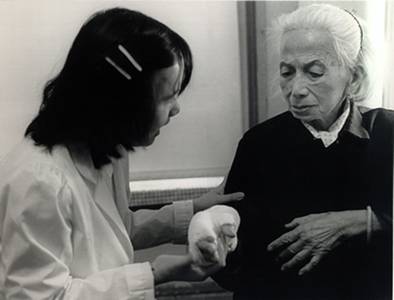|
|
States Consider Allowing Cameras
in Nursing Homes
Charnicia E. Huggins, Reuters
August 23, 2004

Several states are considering the use of video surveillance in nursing homes, to keep an eye on residents and the care they receive.
This oft-debated topic has pitted the nursing home industry, which opposes the so-called granny cams as an invasion of privacy, against those who favor the surveillance as a means of discouraging potential elder abuse, according to a new report.
Selket Nicole Cottle, who authored the article in the Elder Law Journal as a student at the University of Illinois College of Law, explores the pros and cons of using video surveillance in nursing homes and concludes that the benefits greatly outweigh any risks or privacy concerns.
"My number one reason for advocating the use of the cameras is that the evidence shows that there is a high incidence of abuse against the elderly, and something has to be done about it," the recent law school graduate told Reuters Health.
"The cameras have the potential for more immediate, widespread results than do other proposed solution to elder abuse, such as mandatory background checks on nursing home workers," she said.
To date, granny-cam legislation has been debated in about a dozen states.
Currently, laws in Texas and New Mexico permit the installation of video surveillance equipment in a nursing home resident's room if the resident or his representative notifies the proper authority beforehand and if the equipment is clearly visible.
Maryland courts have repeatedly refused to enact such laws, however, despite the persistence of Maryland State Delegate C. Sue Hecht. Her proposal, Vera's law, is named for her mother, who endured verbal abuse as a patient in a Maryland nursing home.
Massachusetts and Florida have conducted studies about the effect of video surveillance in nursing homes, but neither state has enacted legislation concerning it.
There are no laws prohibiting cameras in nursing homes.
About half of Americans who are now 65 or older are expected to be admitted to a nursing home at least once in their lifetime, experts say. And, due to the aging of the baby boom generation, a projected six million individuals are expected to reside in one of the country's 17,000 nursing homes by the year 2040.
As many as three out of every 10 nursing homes, however, have been cited for potential life-threatening "deficiencies." Further, an estimated one in 20 seniors in nursing homes experience some type of abuse, according to the Florida Agency of Health Care Administration.
In January of this year, for example, charges of felony elder abuse were made against 12 Los Angeles nursing home workers who allegedly neglected to provide routine care for a patient and falsified her medical records, according to the Los Angeles Times. A hidden video camera in the patient's room provided the evidence needed to charge the workers.
Later that same month, the Boston Globe reported that a former nursing home employee had been charged with "kicking, tripping, punching, and abusing" five elderly patients under his care while he was employed as a certified nurse's aide in 2002 and 2003.
"The cameras are a way to safeguard against such abuse both because people are less likely to act abusively if they know they are being filmed and because the camera footage will provide residents and families with documented proof of abuse," Cottle said.
The nursing home industry's concern that such recordings can also be used in frivolous lawsuits is a valid argument, according to Cottle, as are their concerns about the privacy of their residents as they dress or are cared for, and the element of distrust that may arise due to the cameras' presence.
"While these are all valid arguments," she said, "I do not think that they are strong enough to outweigh the benefit that the cameras could provide."
In fact, video surveillance in nursing homes may help decrease unnecessary nursing home litigation, some proponents say. It can exonerate staff by showing, for example, that the suspicious bruises sustained by a resident were indeed due to hitting bed rails during restless sleeping rather than staff abuse, Cottle writes.
After weighing both sides of the debate, Cottle recommends that nursing homes be instructed to install granny cams so that residents will be equally protected, regardless of their socioeconomic status or mental health, which might otherwise prevent them from being able to afford the surveillance equipment or from requesting it.
However, the author adds, residents should be free to choose whether the technology is used. Those who are comfortable with the care they are receiving may not welcome cameras in their room, she said, while others may object due to privacy concerns.
If mandated by law, she writes, the "daunting" costs associated with the installation of surveillance equipment would then be considered an ordinary business expense.
"Granny cams should be available to everyone, but not compulsory for anyone who is not comfortable with them," Cottle concludes.
|
|



